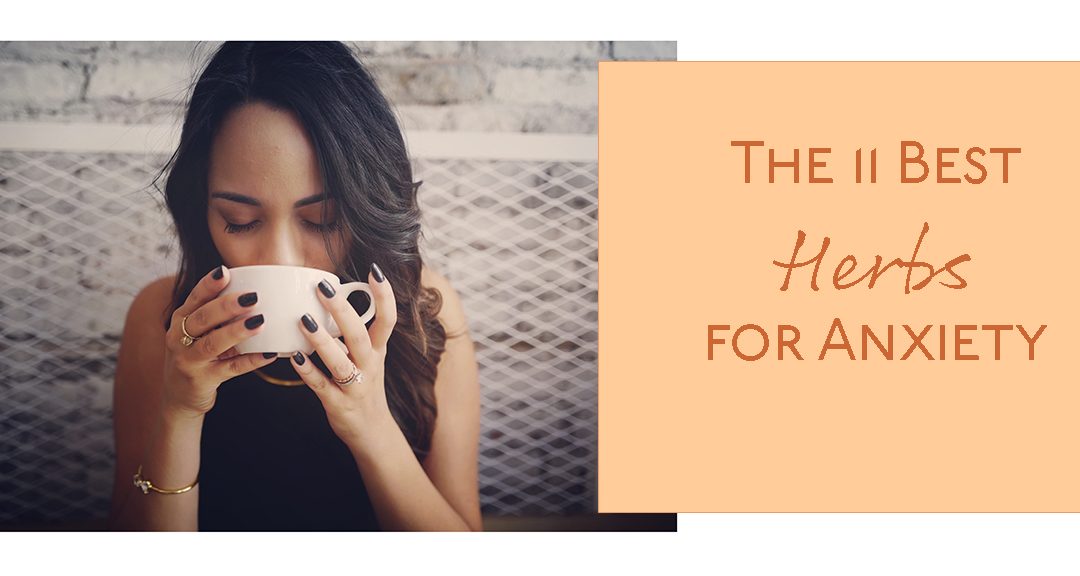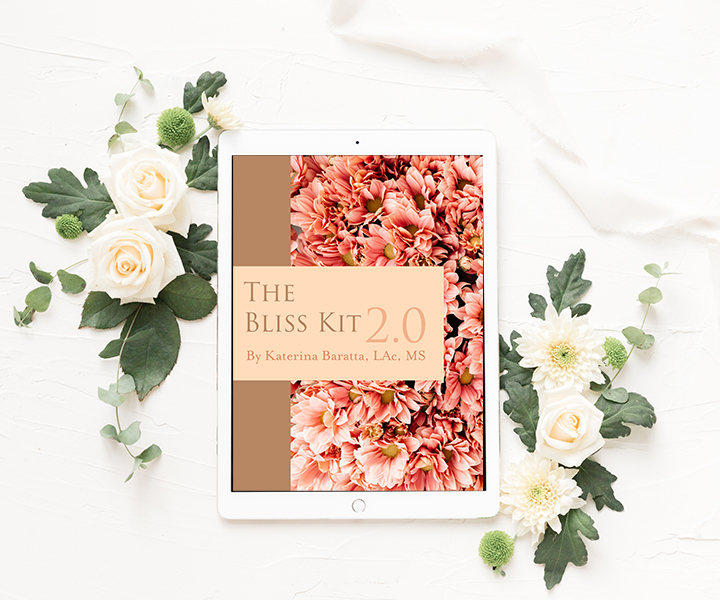Herbs for anxiety are powerful.
While 1 in 6 people take a psychiatric drug according to the Anxiety and Depression Association of America, herbs for anxiety can be just as effective.
They’re natural, which appeals to a lot of people.
Plus, herbs for anxiety usually don’t come with the same laundry list of side effects that pharmaceuticals carry with them.
Which is awesome, because you shouldn’t have to choose between blurry vision and anxiety.
Anxiety is enough of a burden on its own, thank-you-very-much.
And it often comes with a whole set of other symptoms that aren’t necessarily relieved by pharmaceuticals.
Ever tried going to your doctor for pain in your ribs or a stuck feeling in your throat only to be told there’s nothing wrong with you?
Exactly.
This is because pharmaceuticals tend to just cover up what’s going on on the surface.
But in many cases, herbs for anxiety don’t just cover up symptoms like pharmaceuticals do.
Instead, when combined with other stress and anxiety management strategies, herbs for anxiety can help to heal the root cause of why you’re having anxiety in the first place.
Which means that other symptoms that come hand-in-hand with anxiety can also be addressed.
Want help with that foggy-brain feeling you have?
How about insomnia, stomach aches, headaches, digestive and menstrual trouble?
There are herbs for all of that.
What a lot of people don’t realize is that different herbs for anxiety work in different ways.
So while one herb can totally turn travel anxiety around, for example, another herb may be better for a racing mind in the middle of the night.
The following is a description of the 11 herbs I prescribe to my patients most often when they come to me with anxiety.
Before we get into the nitty-gritty details though, a few words of caution about taking herbs for anxiety.
First off, if you’re dealing with severe anxiety that’s getting in the way of your everyday life, please seek professional help.
If you are suicidal, please call the National Suicide Prevention Lifeline at 1-800-273-8255.
Finally, please check in with your doctor if you are taking any other drugs, because some herbs do interact with pharmaceuticals.
You may also want to set up an appointment to get a personalized herbal prescription.
This’ll take all the guess-work out of figuring out which herbs are best for you and allow you to get a tailor-made plan for your exact needs.
But keep in mind that just like with pharmaceuticals, none of these herbs for anxiety are a magic pill that will suddenly fix all of your problems.
If you really want to free yourself from anxiety, you’ve got to make feeling good your #1 priority.
And that means you’ve got to take responsibility for how you feel on multiple levels, mind, body, and spirit.
Healing anxiety requires you to do inner work so you can retrain your neurology so you can make ease, joy, and confidence your default mode.
Sounds good, doesn’t it?!
I’ve done it for myself, so I know first hand how truly life-changing this can be.
And I love that I get to help other women overcome their own anxiety now too.
Herbs for anxiety are a HUGE support in this process.
They can definitely take the edge off when you feel overwhelmed, and I’ve seen them create some incredible transformations.
But while true healing’ll take a more holistic approach, these 11 herbs for anxiety are a great place to get you started.
Here are the 11 best herbs for anxiety:
1. Turmeric
2. Lavender
3. Chamomile
4. Passionflower
5. Lemon Balm
6. California Poppy
7. Ashwagandha
8. St. John’s Wort
9. Rhodiola
10. Kava Kava
11. Chaste Tree Berry
Turmeric
Almost all cases of anxiety are rooted in systemic inflammation.
So in order to heal the root cause of anxiety it’s helpful to start by removing the causes of inflammation (like processed foods and excess sugar.)
But you’re also going to want to add anti-inflammatory herbs and foods into your diet.
And the most powerful anti-inflammatory herb I can think of is turmeric.
Native to Southeast Asia and abundant in recipes from the area, turmeric is one of the most well-studied herbs on the market.
Boasting a long history of helping everything from skin issues, to respiratory issues, joint pain, and digestive complaints, in recent years the extensive benefits of turmeric have been validated by scientific studies, including its effect on anxiety. (1)
Flavor and Thermal Nature:
Bitter, pungent, astringent, and warming
Actions:
- Anti-inflammatory
- Anti-arthritic
- Antioxidant
- Hypotensive
- Tumor-preventing
- Cholagogue and choleretic (increases bile flow from the liver)
- Emmenagogue (stimulates menstrual flow)
- Lowers cholesterol
- Stimulates digestive enzymes
- Carminative (relieves gas)
- Hepatoprotective (protects the liver)
- Vulnerary (heals wounds)
- Anticoagulant (prevents blood clots)
- Cardioprotective (protects the heart)
Recommended Dose:
You can take turmeric as a supplement, but the most delicious way to get it in is to use it in your cooking.
What’s really remarkable about turmeric is that as little as 1/50th of a teaspoon over several months can have benefits. (3)
But I would recommend eating it in 2-5 meals a week if you can.
You can also drink it as a delicious Golden Latte.
But if you don’t really like the taste, then the tinctured extract or a pill might be the way to go. If you choose to go the tincture route, aim for 30 drops, 2x/day.
Pro Tip:
Make sure you take your turmeric with a good dose of black pepper.
The peperine in black pepper has been found to activate the curcumin in turmeric, so when they’re combined you get even more healthy benefits.
Contraindications:
Lay low on the turmeric if you’re pregnant or trying to get pregnant, because it may have uterine stimulating effects. But this generally only happens with large doses, so check with your doctor but you should be good to go if you have turmeric in your food a few times per week.
Also be careful using turmeric if you have gallbladder issues, because turmeric can increase bile flow, which is usually awesome, but may be problematic if you have a blocked duct.
Lavender
While you can safely take lavender internally, this is the only herb on the list that I recommend more highly as aromatherapy.
Lavender is famous for its calming effects.
Flavor and Thermal Nature:
Bitter, aromatic, cool, and drying
Actions:
- Relaxing
- Spasmolytic (helps reduce spasms)
- Anti-inflammatory
- Carminative (relieves gas)
- Stomachic (helps with stomach issues)
- Diuretic (makes you pee)
- Mild sedative for nervous exhaustion
- Stress relieving
- Antidepressant
- Insomnia aid
- Antimicrobial
- May improve mental accuracy
Recommended Dose:
There are a few different ways to take lavender, but again, my #1 go-to with this herb is external.
Test a drop of the essential oil on your wrist to make sure you’re not sensitive to it, and then you can use it in your hair, on your clothes, in a diffuser, or just have it on hand and get a whiff of it anytime you’re feeling wound up.
Lavender essential oil can be very effective against panic attacks.
If you’d like to take it internally, drink 2 teaspoons or a teabag seeped or infused in a cup of warm water.
You can also take 1-30 drops of tincture a few times a day to help with anxiety.
Contraindications:
It’s not recommended to take excessive amounts of lavender internally when pregnant due to it’s possible emmenagogue effects, so if you’d like to use it during pregnancy check in with your healthcare practitioner before you do.
Chamomile
Chamomile is the best herb to choose if your anxiety comes with stomach pain, gas, bloating, and other digestive symptoms.
It can also be very helpful in cases of insomnia.
Flavor and Thermal Nature:
Bitter, aromatic, sometimes slightly sweet (depending on the variety), cooling
Actions:
- Soothing and calming
- Digestive aid
- Anti-spasmodic
- Anti-inflammatory
- Anti-allergenic
- Pain relieving
- Antipyretic (reduces fever)
- Antibacterial
- Antifungal
- Carminative (reduces gas)
Recommended Dose:
Chamomile is generally best taken as a tea. I usually recommend taking 1-5 cups of chamomile tea every day, depending on symptoms and severity.
Contraindications:
Chamomile is generally considered to be safe for anyone, including children. It may cause allergic reactions in some individuals who are sensitive to it. Still, these reactions are extremely rare.
Want to know how to use the rest of these herbs for anxiety?
Enter your name + email now to download your (FREE) PDF Herbs for Anxiety Guide and learn:
• Which of these herbs to use for anxiety that comes with:
-Insomnia
-Digestive trouble
-Panic attacks
-Burnout
-Chronic stress
-The fear of travel
-Depression
-PMS, around your menstrual cycle, or with menopausal symptoms
• The best way to take each of these herbs (tincture, tea, pill, etc.)
• Recommended doses
• Cautions and contraindications
• Where to find the best herbal products
Online References:
https://pubmed.ncbi.nlm.nih.gov/32088675/
http://www.whfoods.com/genpage.php?tname=foodspice&dbid=78
https://pubmed.ncbi.nlm.nih.gov/31728244/
https://pubmed.ncbi.nlm.nih.gov/28471731/
https://pubmed.ncbi.nlm.nih.gov/31046033/
https://www.ncbi.nlm.nih.gov/books/NBK548536/
https://pubmed.ncbi.nlm.nih.gov/20155996/
https://www.ncbi.nlm.nih.gov/pmc/articles/PMC6208354/
https://pubmed.ncbi.nlm.nih.gov/30396607/
https://pubmed.ncbi.nlm.nih.gov/19614563/
https://pubmed.ncbi.nlm.nih.gov/19614563/
https://pubmed.ncbi.nlm.nih.gov/23493923/
Book References:
These are affiliate links with Amazon, so if you choose to buy these books through this link I’ll get a small portion of the profit to support my work. Thank you in advance!
Herbal Medicine from the Heart of the Earth by Dr. Sherol Marie Tilgner
Ayurveda: The Science of Self-Healing by Dr. Vasant Lad
Nutritional Healing with Chinese Medicine by Ellen Goldsmith, MSOM, LAc, DipCH
Prescriptions for Herbal Healing by Phyllis A. Balch, CNC





